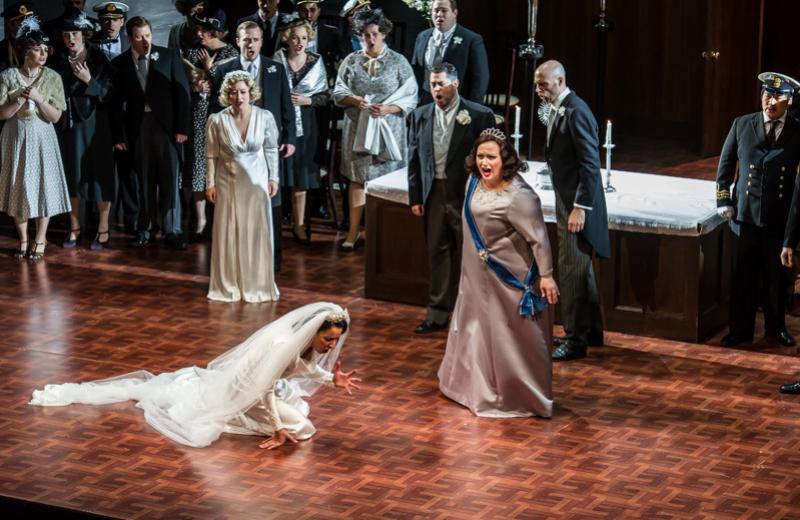Cristina, Regina di Svezia, Chelsea Opera Group, Cadogan Hall | reviews, news & interviews
Cristina, Regina di Svezia, Chelsea Opera Group, Cadogan Hall
Cristina, Regina di Svezia, Chelsea Opera Group, Cadogan Hall
No neglected gem, Foroni's cod-historical opera showcases soprano Helena Dix

One queen is much like another in so-called “historical” Italian early to mid 19th-century opera. Elizabeth of England, Christina of Sweden, take your pick, they all fall for a tenor courtier who loves Another (the seconda donna, soprano or mezzo). With Donizetti, the musical drama is almost as disposable as the plot until a stonking number or two rolls up.
And in New York she probably will: the opera queens just love this sort of all-guns-firing, generous diva with the right top notes. If I’m a little more reserved in my enthusiasm, it’s because I’m not sure the bright soprano sound is entirely ballasted: I wanted a bit more tone colour, more precision in the brief coloratura which there’s so much more of in Donizetti, and for that matter in the role of Elvira in Verdi’s Ernani, which Dix is covering at the Met. In the odd and indiscriminate shape of Foroni’s opera, she starts off crowning the sort of big ensembles Verdi knew better to place at the centre of the drama (here, in typical overkill but lots of work for the chorus, there are plenty more to come). And she rises regally to Christina’s dilemma of abdication which makes this a bigger drama than the usual in the genre, a final showdown of duty versus love which foreshadows in situation, but certainly not in the clunky libretto or the one-size-fits-all music, Verdi’s Don Carlos.
 COG always casts from strength. Here it already had two perfect foils ready-made from Wexford in the less demanding roles of lover and rival: fully Italianate sounding (and looking) American tenor John Bellemer as Gabriele de la Gardie, and the most stylish singer on the concert platform, mezzo Lucia Cirillo, as Maria Eufrosinia, making a perfunctory duet early on in the drama seem interesting (the two pictured at Wexford above). Top marks for style and meaning, too, as always, to veteran David Wilson-Johnson as a Lord High Chancellor well attuned to the sensitivities of a better number, with Dix equally sympathetic at this stage. William Dazeley might be pushing it one step too far as Italianate baritone, arriving late on the scene in the odd dramatic structure, but he gave the cadenza of Carlo Gustavo’s Act Two aria his all.
COG always casts from strength. Here it already had two perfect foils ready-made from Wexford in the less demanding roles of lover and rival: fully Italianate sounding (and looking) American tenor John Bellemer as Gabriele de la Gardie, and the most stylish singer on the concert platform, mezzo Lucia Cirillo, as Maria Eufrosinia, making a perfunctory duet early on in the drama seem interesting (the two pictured at Wexford above). Top marks for style and meaning, too, as always, to veteran David Wilson-Johnson as a Lord High Chancellor well attuned to the sensitivities of a better number, with Dix equally sympathetic at this stage. William Dazeley might be pushing it one step too far as Italianate baritone, arriving late on the scene in the odd dramatic structure, but he gave the cadenza of Carlo Gustavo’s Act Two aria his all.
Comprimario parts all did honour to their contributions. As for the COG Orchestra and Chorus, I’ve never heard them sound better under the ardent baton of Andrew Greenwood (Deborah Miles-Johnson, too, deserves credit for transforming the dedicated amateur choristers). The orchestra actually made me sit up and listen for the only two memorable melodies. The first, in the opening Sinfonia, had me racking my brains for where I’d heard it and the light flashed just before the first scene – it’s the sad ditty sung by Ophelia in Ambroise Thomas’s Hamlet, and the programme note cites it as a popular Swedish tune, the Näckens Polka. The other was a real surprise: in the Act Two introduction, transporting us to an island in the Swedish archipelago, was the rich chordal sequence of Liszt’s “Harmonies du Soir”. A borrowing by Foroni, probably, rather than a plagiarism on Liszt’s part, as the first version of what became the Études d’exécution transcendante first appeared in 1838 and Cristina's Stockholm world premiere followed 11 years later.
These touches certainly piqued interest. For the rest, it was enough to accept that no touch of genius was going to emerge and to enjoy the sheer energy and dedication of the performance – at levels rather deafening in the confines of the Cadogan Hall – as best one could. It's surely time, though, to place Foroni’s Queen Christina back in her coffin.
- Chelsea Opera Group's next opera is Massenet's Le roi de Lahore at the Queen Elizabeth Hall on 1 March 2015
Add comment
The future of Arts Journalism
You can stop theartsdesk.com closing!
We urgently need financing to survive. Our fundraising drive has thus far raised £49,000 but we need to reach £100,000 or we will be forced to close. Please contribute here: https://gofund.me/c3f6033d
And if you can forward this information to anyone who might assist, we’d be grateful.

Subscribe to theartsdesk.com
Thank you for continuing to read our work on theartsdesk.com. For unlimited access to every article in its entirety, including our archive of more than 15,000 pieces, we're asking for £5 per month or £40 per year. We feel it's a very good deal, and hope you do too.
To take a subscription now simply click here.
And if you're looking for that extra gift for a friend or family member, why not treat them to a theartsdesk.com gift subscription?
more Opera
 La bohème, Opera North review - still young at 32
Love and separation, ecstasy and heartbreak, in masterfully updated Puccini
La bohème, Opera North review - still young at 32
Love and separation, ecstasy and heartbreak, in masterfully updated Puccini
 Albert Herring, English National Opera review - a great comedy with depths fully realised
Britten’s delight was never made for the Coliseum, but it works on its first outing there
Albert Herring, English National Opera review - a great comedy with depths fully realised
Britten’s delight was never made for the Coliseum, but it works on its first outing there
 Carmen, English National Opera review - not quite dangerous
Hopes for Niamh O’Sullivan only partly fulfilled, though much good singing throughout
Carmen, English National Opera review - not quite dangerous
Hopes for Niamh O’Sullivan only partly fulfilled, though much good singing throughout
 Giustino, Linbury Theatre review - a stylish account of a slight opera
Gods, mortals and monsters do battle in Handel's charming drama
Giustino, Linbury Theatre review - a stylish account of a slight opera
Gods, mortals and monsters do battle in Handel's charming drama
 Susanna, Opera North review - hybrid staging of a Handel oratorio
Dance and signing complement outstanding singing in a story of virtue rewarded
Susanna, Opera North review - hybrid staging of a Handel oratorio
Dance and signing complement outstanding singing in a story of virtue rewarded
 Ariodante, Opéra Garnier, Paris review - a blast of Baroque beauty
A near-perfect night at the opera
Ariodante, Opéra Garnier, Paris review - a blast of Baroque beauty
A near-perfect night at the opera
 Cinderella/La Cenerentola, English National Opera review - the truth behind the tinsel
Appealing performances cut through hyperactive stagecraft
Cinderella/La Cenerentola, English National Opera review - the truth behind the tinsel
Appealing performances cut through hyperactive stagecraft
 Tosca, Royal Opera review - Ailyn Pérez steps in as the most vivid of divas
Jakub Hrůša’s multicoloured Puccini last night found a soprano to match
Tosca, Royal Opera review - Ailyn Pérez steps in as the most vivid of divas
Jakub Hrůša’s multicoloured Puccini last night found a soprano to match
 Tosca, Welsh National Opera review - a great company reduced to brilliance
The old warhorse made special by the basics
Tosca, Welsh National Opera review - a great company reduced to brilliance
The old warhorse made special by the basics
 BBC Proms: The Marriage of Figaro, Glyndebourne Festival review - merriment and menace
Strong Proms transfer for a robust and affecting show
BBC Proms: The Marriage of Figaro, Glyndebourne Festival review - merriment and menace
Strong Proms transfer for a robust and affecting show
 BBC Proms: Suor Angelica, LSO, Pappano review - earthly passion, heavenly grief
A Sister to remember blesses Puccini's convent tragedy
BBC Proms: Suor Angelica, LSO, Pappano review - earthly passion, heavenly grief
A Sister to remember blesses Puccini's convent tragedy
 Orpheus and Eurydice, Opera Queensland/SCO, Edinburgh International Festival 2025 review - dazzling, but distracting
Eye-popping acrobatics don’t always assist in Gluck’s quest for operatic truth
Orpheus and Eurydice, Opera Queensland/SCO, Edinburgh International Festival 2025 review - dazzling, but distracting
Eye-popping acrobatics don’t always assist in Gluck’s quest for operatic truth

Comments
There's nothing quite like
I for one am grateful that
In defence of Foroni I am
Chapter and verse defence of
Chapter and verse defence of Foroni much appreciated, Andrew (if I may). Even so, I'm sorry you find my opinion 'risible'. Of course you have lived with this work over a year now, and it must be irksome to read a relatively callow response. Nevertheless my duty here is to represent the approach of most of the audience - ie a first-time reaction - whether they agree with me or not (some clearly don't; several musicians I spoke to did).
True, Cristina's lines soar above the ensemble, and I admired the final move beyond personal jealousy interesting in principle if not in musical practice. But I came with very high expectations which I found confounded by the squareness and loudness of so much of the score. I wouldn't expect to grasp everything at a first hearing, but I should hope to go away wanting to hear some numbers again, and I don't. May Cristina's future lie in a CD release of the Wexford performance (broadcast, if I remember, on BBC Radio 3).
As for DMA's less polite defence of Helena Dix, I assure you I'm not hedging. Let me spell it out for you: this kind of diva is not to my taste, the voice could do with refining, but the talent is undoubtedly there. And this certain divadom IS very much to the taste of the Met audience, which has already gone overboard about Christine Goerke, a very talented singer with problems that Dix doesn't have. But do try to lay off personal speculation; it detracts from your argument
I saw the Wexford performance
Orchestral sophistication,
Orchestral sophistication, Alex, yes, I'd agree. The sticking-point is whether the euphoria created on Saturday and, by all accounts, at Wexford was due to the manner of the many blood-and-thunder ensembles so passionately delivered rather than the actual matter, which is generically good, I thought at the time, but not (IMO) inspired. As for Verdi's inspiration still to come, don't forget Macbeth, which predates Cristina and is a work of much greater genius, no question. Luisa Miller dates from the same year, too. Thanks for the news about the CD.
Ah yes, I suppose you're